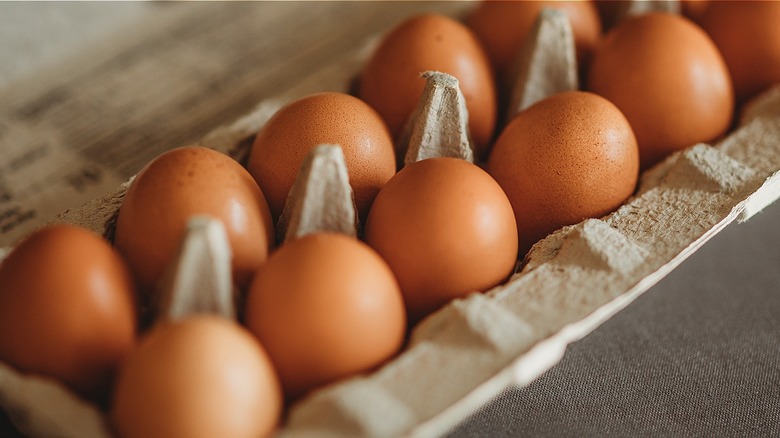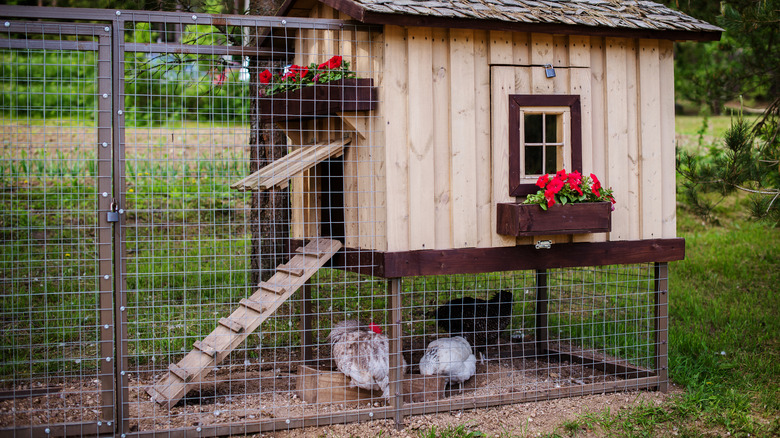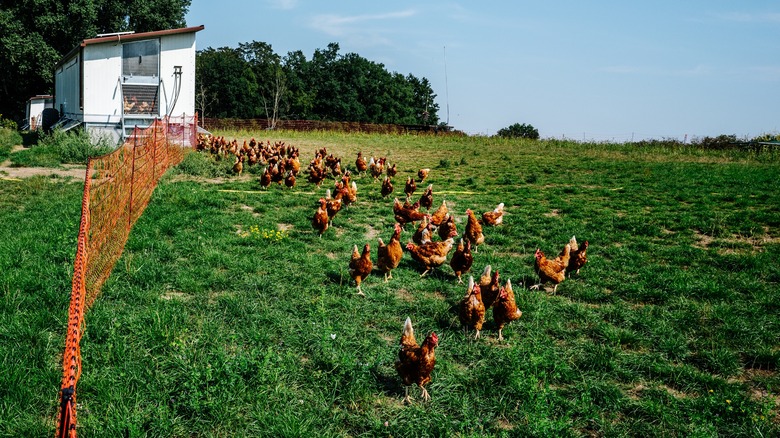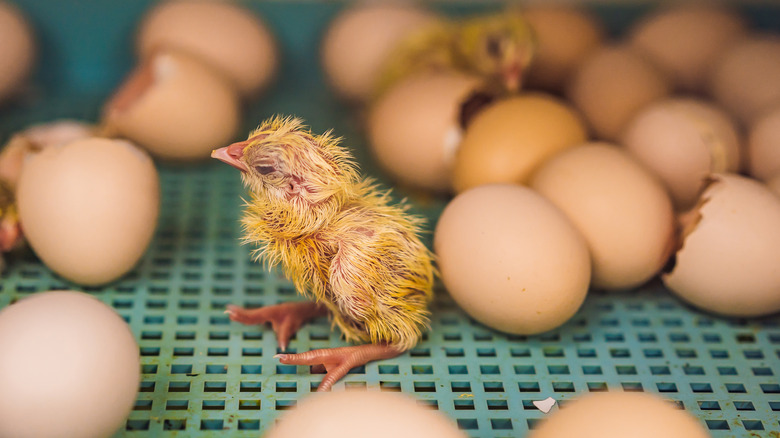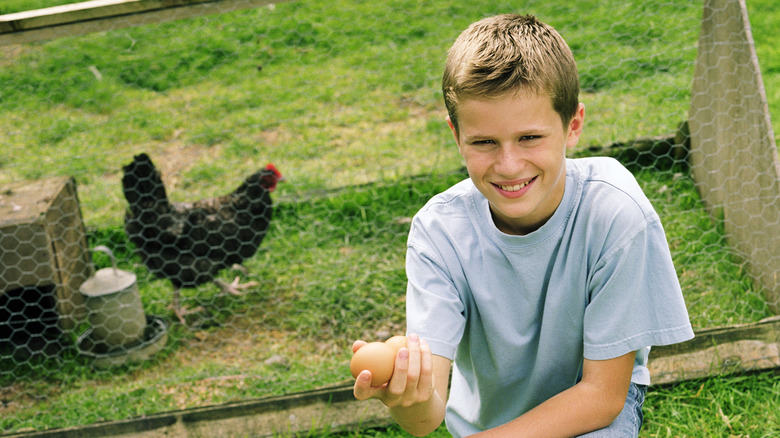Will Buying A Chicken Actually Save You Money During The Egg Crisis?
Eggs are expensive these days. The egg-price story has garnered so much attention that Forbes has even suggested that the story itself may be part of the problem, the end may be in sight, and egg prices may finally be going down.
But in the meantime, paying for those still-pricy eggs is no laughing matter (despite having sparked the internet hilariously making fun of high egg prices). The challenge of raising the extra cash for egg funds has revved entrepreneurial engines across the country: Americans nationwide are thinking about cutting out the egg middleman and going straight to the source. Why not skip the store and just get chickens? The logic appears solid: Chickens are tame. Chickens are cheap. Chickens lay eggs. Why not buy some chickens as pets and have a continual source of fresh eggs? Problem solved!
This thought is prevalent enough that it's causing chicken shortages at hatcheries. Major hatcheries like McMurray and Meyer can send baby chicks to other states through the post office, but there is quite a backlog of orders these days as many look to live chickens to ease their egg woes, per The New York Times. Heavy egg layers have proven especially popular, and McMurray is sold out of orders on those breeds through the summer. But will getting a chicken actually be worth the savings during the egg crisis?
The short answer: Probably not
But before you rush to hop on the chicken bandwagon, you need to know the facts. There are a number of financial reasons against raising chickens to solve your domestic egg crisis.
Consider the initial investment. Purchasing chicks won't set you back much, though you'll need to buy all female birds or pullets for eggs. First of all, you'll need someplace to put your chickens once they've hatched but not all residential areas in the U.S. are zoned for raising chickens. While the decision to keep indoor pets is usually a homeowner's decision (with some exceptions), chickens are subject to restrictions. Some local municipalities prohibit people from having chickens entirely, and others impose fees on chicken ownership. If you find out that chickens are illegal in your area after you purchase chickens, your investment is sunk and you'll need to figure out what to do with your fowl, too.
If chickens are permissible in your area, you still need to house them. Chickens normally live outside, and that requires both a considerable amount of outdoor space and a structure that provides protection from predators since sitting birds are very vulnerable. Most parts of the country abound in predators more than happy to enjoy a fresh chicken dinner at your expense. Foxes, hawks, coyotes and weasels could pose routine threats to chicken flocks, as do domestic dogs and cats. These risks and costs could outweigh the financial benefits of not purchasing eggs.
Further considerations
Chickens need a space that protects them, particularly at night. But night-time protection isn't the only time chickens need to be sheltered from harm. While chickens can be kept in total confinement — as is routinely practiced by many farmers and egg suppliers – ideally chickens should be allowed to roam and forage during the day. But providing them with outside spaces which are also safe (a chicken run) can get a bit involved and pricey, especially for those who aren't handy enough to build their own. Keeping a rooster can help fend off some predators, but some areas have specific prohibitions on roosters since their crowing can be a nuisance for neighbors. Also, roosters won't help you in the egg department.
Feeding chickens is a pretty minor expense, especially when you consider that those chickens can eat a variety of things – even cannabis-infused chicken feed. But chickens are also susceptible to disease, and keeping them healthy can incur vet fees that can cut into your bottom line. With all these expenses, you might wonder how people can afford to keep chickens at all! There are initial investments and there is a definite learning curve, but once people have their structures and plans in place, they can manage to make it work for them.
The longer answer: It depends
Once homeowners or famers have a coop and run set up, expenses start to drop off. While feed and vet bills will continue to factor into the equation, you won't have too many other big expenses. If you keep a rooster, your hens will also produce fertilized eggs, chicks, and eventually fully-grown pullet hens in addition to your egg supply — something you couldn't do by hatching supermarket eggs.
By selling some of those eggs, chicks, and hens you can start to turn a profit — or at least minimize expenses. Keeping more chickens won't add significantly to your costs, as long as you have room for them in your coop and run. If you really want to tip the economics of scale, you can supplement your flock with meat birds. With meat birds, you don't need to worry whether they're male or female, and you don't need to wait for them to start producing eggs, since that's not the goal.
But the heart has its reasons
Not everyone who's interested in fresh eggs is ready for a fully sustainable farm model, however. But there are many people who choose to keep chickens despite not turning a profit. While chickens are not as cuddly as kittens, or as loyal and responsive as dogs, many people find them to be entertaining and endearing pets. Furthermore, if seen through the prism of pets rather than profits, chickens look like a much better investment. They are, on average, less expensive to maintain and care for than dogs and cats and far less costly than other farm animals.
The farm connection is another element contributing to chickens' popularity. 35% of American homes have gardens that yield edible fruits and vegetables, per Garden Pals. Chickens feed naturally into the gardening trend, since their droppings can be used for composting and fertilizing, so keeping laying hens is a simple enough way to supplement home-farmed vegetables with a little additional nutrients. The experience of growing your own food could be a gratifying enough experience to make it worth the trouble for many, and keeps backyard poultry farmers coming back for more (chicks, that is).
Which brings us back to the beginning: which came first: the eggs — or the chickens?
